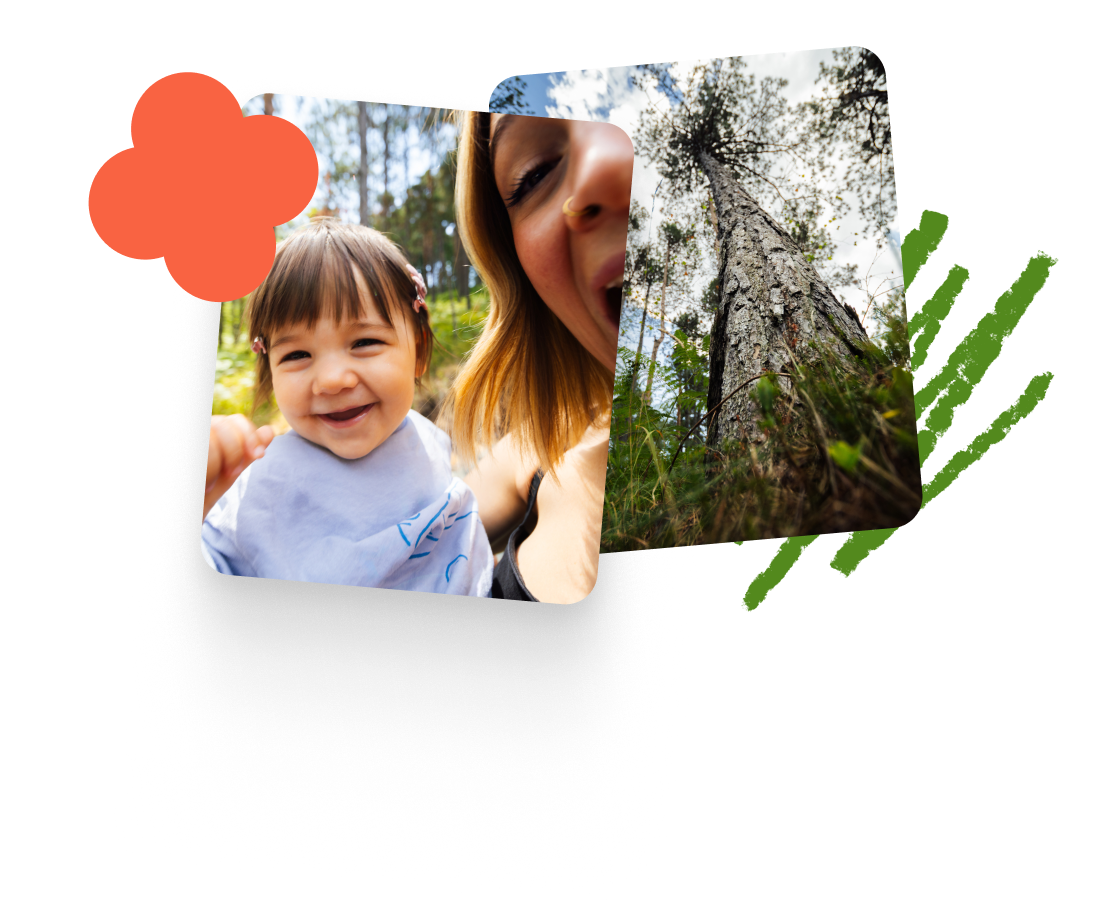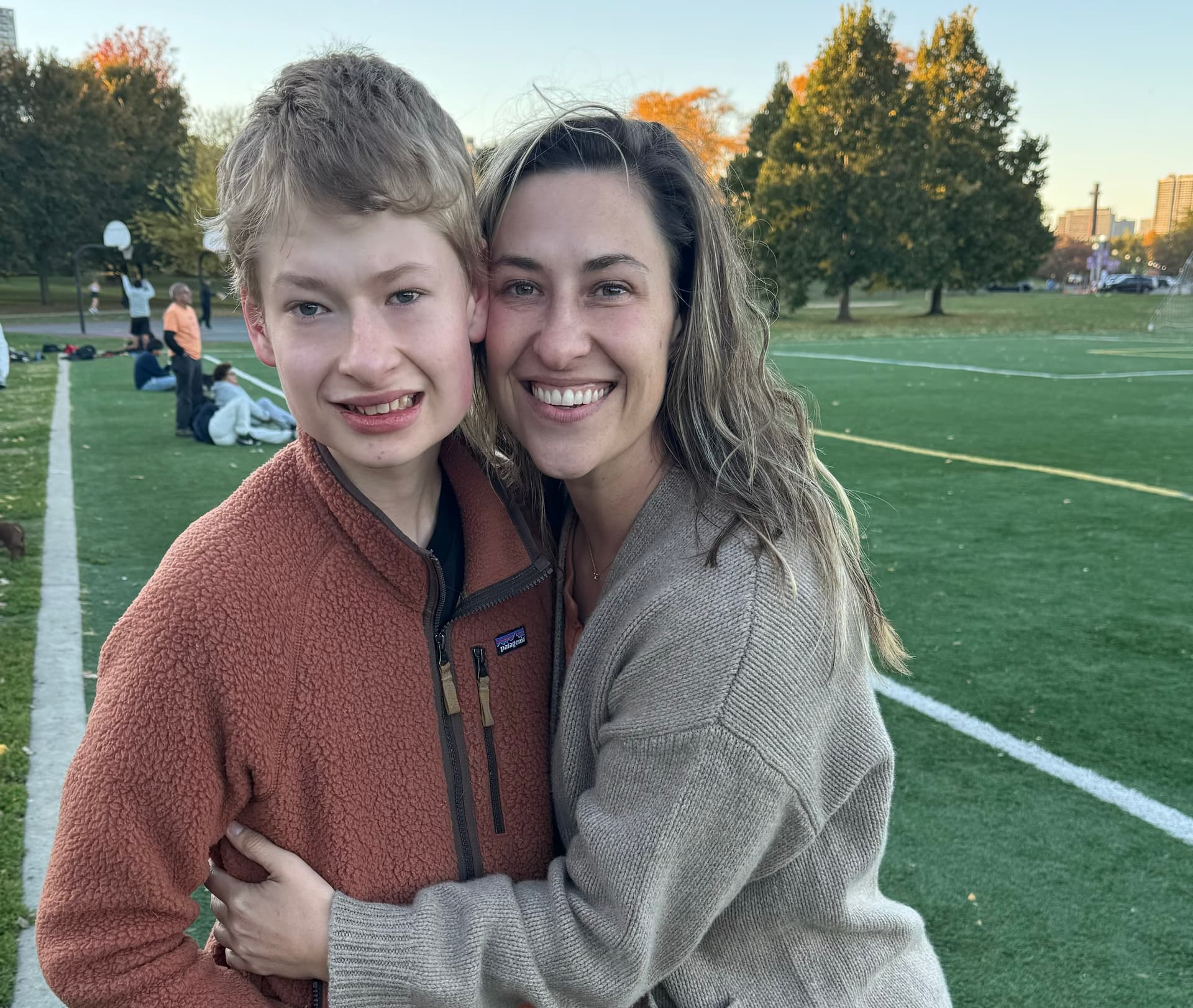
is now part of
Joy Parenting Club!
Families and care organisations using Heba will now have the option to also join Joy. For any questions, reach out to us at hello@heba.care

Families and care organisations using Heba will now have the option to also join Joy. For any questions, reach out to us at hello@heba.care

November 26, 2024
Meet the mental-health expert offering worldwide, judgment-free consultation to parents who, like her, are raising disabled kids.
Sometimes, an Instagram post will stop you in your scroll. If you’re a caregiver, there’s a very good chance that Instagram post was produced by Amanda Griffith-Atkins – a therapist with a knack for extracting our deepest thoughts and turning them into beautiful, heart-hitting prose.
How does this Chicago-based professional know exactly what’s in our heads? She’s one of us – and has been for 15 years.
The eldest of Amanda’s three sons, Asher, has a rare genetic condition called Prader-Willi syndrome. And once she discovered the healing power of connecting with fellow caregivers, this licensed marriage and family therapist turned her expert eye (and ears) to her own community.
Be it through therapy, counselling or her prolific social media posts, Amanda helps us navigate the hardships and celebrate the highs surrounding caregiver experiences.
While we wait to devour her upcoming book, How to Handle More Than I Can Handle: Caring for Yourself While Raising a Disabled Child, which will launch in June 2025, Amanda sheds some light on what happens in her tailor-made caregiver therapy sessions.
You support people to process the hard stuff many grapple with while raising a disabled child. When Asher was first diagnosed, what helped you process your hard stuff?
Honestly, in the very beginning I didn’t process. There were years where I was really stuck in survival mode, completely traumatised and living under a rock. I was 26 when I had Asher. He was my first child and he had all these issues, so I ended up quitting my job and being a stay-at home-mum for a few years.
In those early days, I really didn’t give myself permission to feel the hard feelings. It was like: I’m a warrior, this is my job. I’m going to be the best mum ever and it would be bad if I had hard or complicated feelings about this. But then at some point, I was like, this is crazy. The craziest thing happened to me and my son is dealing with so much. I’m allowed to have feelings about it.
Then talking to other parents and hearing that I’m not alone – other parents feel the same way – that was the most soothing thing for me. Just being really open about my struggles and having other parents be like ‘I feel the same exact way’.

You now offer that same comfort and camaraderie through your work as a therapist, where you provide tailored therapy packages for caregivers. Why did you start offering this service – and what do these sessions generally look like?
I kept getting DMs from people all over the world asking, can you be my therapist? So I was racking my brain because I’m only licensed to practice as a therapist in Illinois. The coaching field, however, is kind of non-regulated – for good or for bad – so I’m able to meet with people outside of my state under that consultation umbrella.
People schedule their initial consultation online and then I send them a form that asks questions like: What do I need to know about you? Do you want to share your child’s diagnosis? How’s your marriage? What’s your support system like? Just taking a quick inventory of what they’re struggling with and what they want to talk about.
When we meet, I want to help them identify what they’re feeling – they might be feeling jealous, or feeling a lot of anger, or feeling abandoned by people, or feeling really overwhelmed – and then I get into problem-solving mode. But more than anything, I really just want to hear, what are the things that you feel like you can’t say? You can say that here and I won’t judge you. In fact, I'll probably relate to you.
What I noticed is that, once parents have the space to talk about the hard stuff about their kids, suddenly they start talking about the good stuff about their kids. Like ‘they’re so resilient’ and ‘they’re so cool’, ‘this is my favourite thing about them’, or ‘I love it when they do this’.
We very quickly realise that all the hard stuff and the good stuff – it’s all right there, you know? It’s just that we feel like we have to focus on the good stuff, which makes us feel like we can't even look at the hard stuff.
Then we get into problem-solving mode in the sense of, what’s your support system? What do you do when you feel these emotions? A lot of the people I’m meeting with are mums that are totally overwhelmed and in the trenches, doing everything. Maybe they’re home full-time and their partner works full-time and so somehow, over the years, it’s just become their job to schedule all the doctor’s appointments and do all of it.
Generally speaking, how do you problem-solve in this kind of scenario?
I will say that we need to step back and look at the division of labour and the mental load. This is unsustainable, you know? So then the conversation becomes okay, how can you let go of some things to your partner? Because we’re complicit in this pattern too. Yes, I want you to make the doctor’s appointment. But also, did you ask this question? Did you ask this question? We’re micromanaging, right?
A lot of what I talked to mums about is, who can you let go of some of this stuff to? And how can you work on really letting it go and trusting your partner and like freeing up your brain space for something else. I’m a trained couples therapist, too, so we can do couples work simply around division of labour.

This is part of how you help parents take better care of themselves – although we do love how you wrote, in one of your Instagram posts, that asking a parent of a medically fragile child to do self-care is like telling them to open their umbrella in a hurricane…
Self-care has become such a cliche term. We always hear about it in reference to things like massages and pedicures. But self-care might be making a dentist appointment. It might be going to physical therapy. Self-care isn’t always indulgent.
For parents of disabled kids, I think we have to look for what really brings us joy. What brings you joy? What fills your cup? What makes you happy? When do you feel most yourself? When do you feel emotionally safe? And a lot of us really have a hard time answering that because we’re so disconnected from our body. The answer I often get is, ‘well, I just love laying in bed and watching TV’.
That’s a fine answer to some extent, but it probably isn’t filling your emotional or relationship needs. We’ve got to think bigger picture than just, ‘I’m exhausted and just want to lay around’, you know? If that’s the only thing that’s filling your cup, to me, that’s a sign of burnout. You have to give yourself the opportunity to connect with your sense of self.
What do you like? I love putting on headphones and listening to music. I also love people watching and seeing peoples’ fashion – these are the things that fill my cup and I could do them all day long. These are the things where I really feel rejuvenated – like I’ve had a minute to catch my breath.
It’s a big question, but it starts with self-awareness as to what fills your cup and what brings you joy. If you can’t answer that question, I would say you need to rewind and reconnect to yourself. Think about who you were before you had kids. Think about maybe developing a new hobby – that’s high-level self-care. Lower level would be like, are you going to the dentist? Are you doing your physical check every year? Are you moving your body? More of those basic human needs.
What advice do you have for caregivers who don’t feel they have time to see a therapist for themselves?
I recently had someone get in touch who wanted couples therapy at 8pm. And I was like, I totally understand. Your kid’s going to be in bed, that’s the only time you do. But you are not going to find a therapist at 8pm for couples therapy.
We have to prioritise therapy. I know it sounds so cliche, but you have to give yourself the permission to take up space in your schedule. When our kid has a 3pm occupational therapy appointment all the way across town, we’re going to do it. We’re leaving work early and making it work. We prioritise these things but when it comes to our own care, we feel like it’s not that big of a deal.
Part of solving this comes down to finding a good therapist. We’ve probably all been in therapy where we’ve felt like it wasn’t worth it. Where you go into couples therapy and your therapist is like, ‘Well, have you guys tried to find a babysitter?’ And you’re just like, what?! Yes, I tried to find a babysitter, but nobody wants to take care of my kids!
This is why I’ve started a directory with US-based therapists and a few in other countries, too – to try and help people connect to somebody who feels worth it. Somebody who isn’t just nodding and saying, ‘that sounds so hard’. Someone who can help with coping skills and resolving some of the hard stuff.
The first step is finding someone that you really connect with and then prioritising it. Like, through hell or high water, you will be at therapy.
To those who are fresh to the experience of parenting a disabled child – who are where you were, 15 years ago – what words of advice would you like to pass on?
You’ve just got to take this one day at a time in the beginning. It feels so daunting. I remember the first time I Googled PWS and it was bad, bad, bad. I was like, what is my life? How I'm going to be a caregiver? What is his life going to be like?
There’s so much stuff that you don’t know in the beginning and I just wish that I could hug every new parent and be like, you're going to get through this. Try not to think about the big picture right now. Just think about feeding yourself, feeding your child, enjoying your child, looking at their little toes and their little hands. They’re still your baby – they’re still your precious, amazing baby – and that is not taken away.
That's the first thing I would say and then, maybe after a few months pass, I would say something like, the disability community is so rich and diverse – and you now get to, by proxy, be a part of this incredible world where differences are celebrated and accepted.
Having a child with a disability will open up your eyes to such vastness in the world that you may have otherwise missed out on. And it’s actually such a shame that so many people do miss out on that, you know?
Follow Amanda’s work on her Instagram account and visit her website to check out her services and directory of therapists.